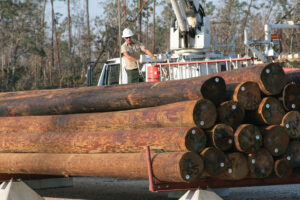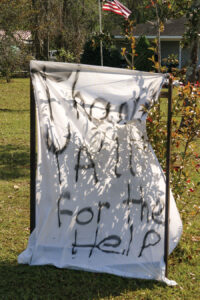On August 29, 2005, Hurricane Katrina made landfall in electric cooperative territory, blacking out some 600,000 co-op meters in Louisiana and Mississippi. Co-ops in the two states suffered more than $360 million in damages and that doesn’t count the damage to more than 100 co-op staffers who lost their homes, cars, picture albums, kid’s clothes, keepsakes … everything … yet went back to work to restore power and hope. The storm brought on the most massive relief effort in the history of the co-op movement and showed how workers extended a helping hand to both their co-op families and their communities.
In Illinois, the Emergency Work Plan was activated and 20 electric cooperatives sent 139 linemen, along with trucks and diggers, to aid in the recovery effort and were among the first to arrive in Alabama and Mississippi. With the help of ECT.coop and the Electric Power Associations of Mississippi, we take a look back at the cooperation among cooperatives that helped to restore power to those storm-ravaged areas.
 In the state of Mississippi, nine of the 25 electric cooperative distribution systems were completely destroyed and the other 16 suffered greatly. Ron Stewart, senior vice president of communications for the Electric Power Association of Mississippi reported that 64 percent of Mississippi cooperative members were without power – almost half a million families. Nearly 50,000 poles were destroyed, and demand for fuel and materials to rebuild was stretched to the breaking point. But in spite of all that Mother Nature had thrown at them, members were understanding and resilient.
In the state of Mississippi, nine of the 25 electric cooperative distribution systems were completely destroyed and the other 16 suffered greatly. Ron Stewart, senior vice president of communications for the Electric Power Association of Mississippi reported that 64 percent of Mississippi cooperative members were without power – almost half a million families. Nearly 50,000 poles were destroyed, and demand for fuel and materials to rebuild was stretched to the breaking point. But in spite of all that Mother Nature had thrown at them, members were understanding and resilient.
More than 12,000 electric cooperative crew members worked dawn to dusk, and beyond, to restore power to those affected, knowing full well they could possibly need the help after a future natural disaster – be it ice, snow, tornadoes, fires or floods. These dedicated and safety-conscious individuals had to rebuild thousands of miles of power lines.
 With temperatures reaching 100 degrees and humidity as thick as a blanket, crew members worked to remove broken trees, poles and lines just so they could start on the rebuild. It was estimated to take six weeks to get power restored in those areas that were capable of receiving it safely. They did it in three.
With temperatures reaching 100 degrees and humidity as thick as a blanket, crew members worked to remove broken trees, poles and lines just so they could start on the rebuild. It was estimated to take six weeks to get power restored in those areas that were capable of receiving it safely. They did it in three.
Housing and feeding the visiting crew members was another huge challenge. More than 12,000 emergency volunteers from 22 states had to eat and sleep somewhere. Coast Electric erected a “tent city” where crews ate and slept and showered in mobile trailers. Local employees’ family members joined others to help prepare meals and launder clothes.
The veteran Illinois linemen who volunteered were completely shocked by the total devastation they encountered. They had experienced terrible destruction due to ice storms or tornadoes, but that paled in comparison.
Randy Smith, general manager, Dixie EPA, recalls, “Oh, the need was huge. We had contractors coming in also, but it was different in the respect that usually our help comes from within the state so we’re helping each other. Well, everybody in the state had damage, you know, so we had people from Michigan, we had people from Illinois, we had people from North Carolina, Georgia, Florida, pretty much everywhere. Just those guys coming in to help us and basically just hitting the ground running, it made a huge impact.”
Dan Wooten, serviceman, Dixie EPA, remembers, “Randy Smith said, ‘Dan, can you handle another crew? And I said, Yes, sir. I can put them on Dew Mills Road. It’s a bad line. Who are they? He said, They’re Egyptian. I said, Now, you don’t need to give me nobody I can’t talk to. I don’t talk no Egyptian. And he laughed. He said, No, crazy, it’s Egyptian Electric. They’re from Illinois. And when he said Illinois, well, I’m a deer hunter. Most of us linemen love to hunt and fish. I said, Boy, he’s from Illinois, that’s probably where the big bucks are.’ And me and that foreman, we became best friends. We go on hunting trips and elk hunting trips, all kind of stuff. I met some fine men during that time.”
 Journeyman Lineman Brian Anderson of Adams Electric Cooperative said, “We worked to restore power to an elementary school one day. They had converted it in to a shelter and a hospital. They were running a few lights and fans off a generator. Most of the people there still had on the same clothes they had on when the hurricane hit. When we finally got the school back on, people came out and started clapping. That was going to be their home for some time and now they could run all the lights and air conditioning. It was great to drive off that evening and see all the lights on. Brad Smith and I were tired. Our feet hurt, but after we saw that we weren’t tired anymore. It was a great feeling.”
Journeyman Lineman Brian Anderson of Adams Electric Cooperative said, “We worked to restore power to an elementary school one day. They had converted it in to a shelter and a hospital. They were running a few lights and fans off a generator. Most of the people there still had on the same clothes they had on when the hurricane hit. When we finally got the school back on, people came out and started clapping. That was going to be their home for some time and now they could run all the lights and air conditioning. It was great to drive off that evening and see all the lights on. Brad Smith and I were tired. Our feet hurt, but after we saw that we weren’t tired anymore. It was a great feeling.”
The cooperative spirit was as alive and well 10 years ago, in Mississippi, as it is today. Co-ops from around the country will drop everything to help out fellow cooperatives knowing that but for the grace of God, it could have been them.








